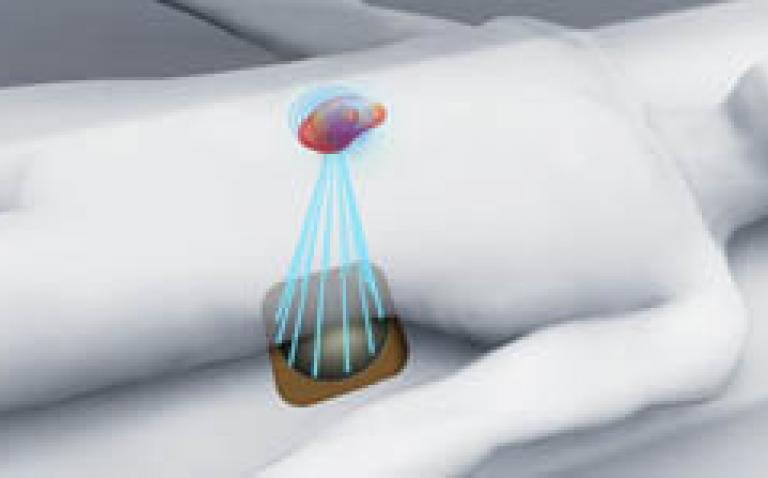The University Medical Center Utrecht (Utrecht, The Netherlands) and Royal Philips Electronics (NYSE:PHG, AEX:PHIA) have announced that they have started a pilot clinical study to evaluate a new treatment for breast cancer based on a technology called MR-guided High Intensity Focused Ultrasound (MR-HIFU). To facilitate this study, Philips has built a dedicated investigational system optimised for the anatomy of the female breast. The first patient in the study has already been treated using the system.
MR-HIFU has emerged as a technology with the potential to non-invasively destroy tumours by heating them up while they are still inside the body. As its name suggests, high intensity focused ultrasound directs sound energy into a tumour. This sound energy then dissipates in the tumour generating heat. The technique is capable of achieving tissue temperatures in excess of 65 degrees Celsius, high enough to kill tumour cells without damaging the surrounding tissue. Magnetic Resonance imaging (MRI) provides real-time imaging of soft tissue structures so that the HIFU beam can be accurately focused onto the tumour. It also spatially maps local tissue temperatures in order to provide real-time feedback for controlling the applied temperature profiles.
To perform the study, UMC Utrecht is working closely with the Diakonessenhuis Hospital (Utrecht, The Netherlands), from which patients are being enrolled. The MR-HIFU treatment is being carried out under local anaesthetic or sedation. Following this treatment, a conventional surgical procedure will be performed to verify the precision of the treatment. The initial aim of the study is to assess the image quality achieved by the MR-HIFU system as well as the safety and precision of the technique in this particular application.
“This new pilot study targets patients with small breast tumours that have not metastasised; these patients belong to a group that encompasses approximately a quarter of all breast cancer patients in the Netherlands,” says Maurice van den Bosch, MD, interventional radiologist and research leader at the University Medical Center Utrecht. “An important aspect of the MR-HIFU technique is that the skin stays completely intact, since everything can be done non-invasively: operating without making any incisions.”
“MR-guided HIFU could become a very powerful tool in the hands of physicians,” says Falko Busse, General Manager MR-Therapy at Philips Healthcare. “The benefits of its non-invasiveness have already been shown in the treatment of benign tumours of the uterus, offering patients an outpatient procedure with faster recovery and lower complication rates than surgical removal. We are now further developing this technology with the ultimate goal to advance cancer care.”
This pilot study into MR-HIFU treatment combines the clinical expertise and medical technology know-how of UMC Utrecht and Philips respectively. The study is part of a larger Dutch research program with a total budget of €11 million. The Center for Translational Molecular Medicine (CTMM) – a public-private partnership for Netherlands-based translational research – is the main funder of the program. Philips and the Netherlands Organisation for Health Research and Development (ZonMw) are also contributors.










